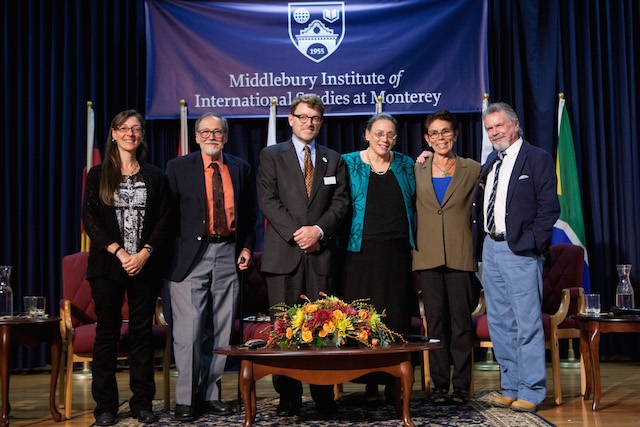Inaugural Symposium Explores “Translatability,” Power of Language

“Translatability is a process of mutual modification,” suggested new Middlebury president Laurie L. Patton at an October 4 symposium in Monterey celebrating her inauguration as the 17th president of Middlebury. The symposium, titled “The Challenge of Translatability: 21st-Century Practices, Policies, and Possibilities,” led off with
, which described translation as an imperfect process requiring change on both sides in order to achieve mutual understanding.
Focusing on how to translate the Institute’s mission and narrative for external audiences, Patton noted that its work centers around three themes: language, policy, and social change. The Institute “knows that the power of language is at the core of human relationships… Language drives change and the more humans can master language, the more social change and the better policies there will be in the world.”
Patton’s keynote was followed by a lively roundtable discussion moderated by Vice President and Dean of the Institute Jeff Dayton-Johnson, featuring three Institute professors: Laura Burian (Translation and Interpretation), Peter Shaw (Teaching English to Speakers of Other Languages), and Lyuba Zarsky (International Environmental Policy), as well as Peter Burian, who taught classical and comparative literature and theater studies at Duke University from 1968 until 2015.
Taking climate change as an example, Professor Zarsky spotlighted the central role language continues to play in international policy deliberations. “When my students get discouraged” about the seeming lack of progress on climate change, “I point out to them the extraordinary nature of 200 countries coming together and trying to forge a common way forward. It’s very much about forging a common language.” Referencing efforts to “raise the level of ambition” for countries taking part in these deliberations, Zarsky underscored how that phrase captures and amplifies the psychological dimensions of the policy conversation.
For his part, Shaw emphasized that “When I learn something about another language, I also learn something about my own language, and about language in general.” Crediting his non-English language professors with improving his ability to write in his native tongue, Shaw explained that “My English teachers taught literature. The way I write in English is the product of my classical Greek, Latin and French teachers pecking at my linguistic liver daily about very small decisions about word choice and syntax and discourse.”
Summing up some of the themes of the discussion, Laura Burian encouraged faculty colleagues to continue “celebrating the imperfection that is before us all the time, whether it’s the imperfection in our language skills, the imperfection of our understanding of the discipline we are grappling with, or the imperfection of our approach to a solution. It’s important to recognize that we’re always grappling with imperfect solutions.”
The symposium, hosted in the Irvine Auditorium, was followed by a reception in the Samson Student Center. A number of alumni in town for the Oct. 2-4 Alumni Reunion attended the symposium as well.
For More Information
Jason Warburg
jwarburg@middlebury.edu
831.647.3156
Eva Gudbergsdottir
eva@middlebury.edu
831.647.6606

